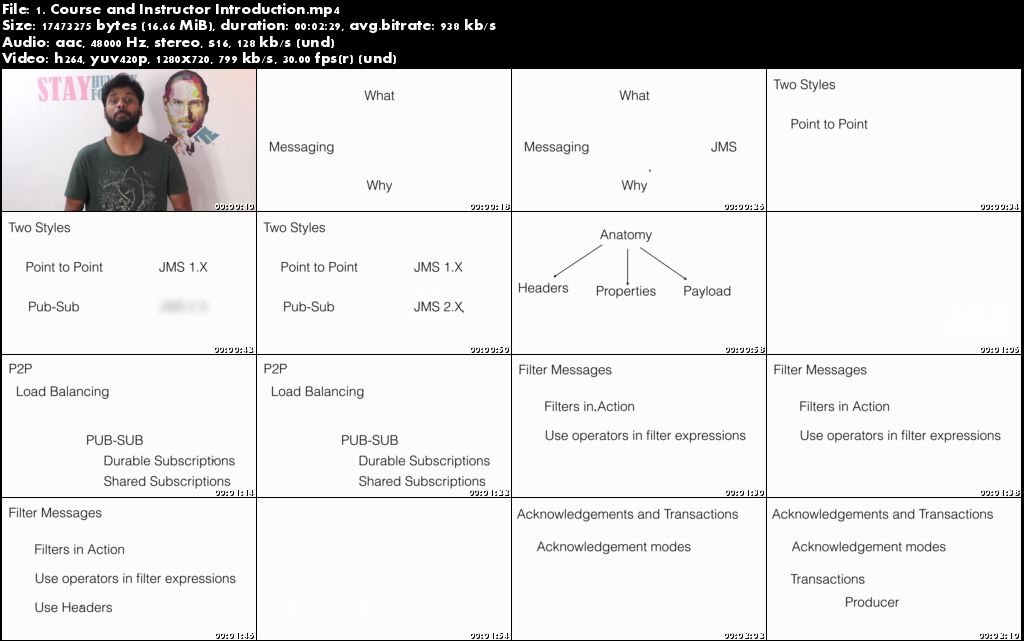
h264, yuv420p, 1280×720|ENGLISH, aac, 48000 Hz, 2 Channels | 5h 27 mn | 2.74 GB
Created by: Bharath Thippireddy
Master the fundamentals of Java Messaging in Simple Steps
What you’ll learn
Learn what messaging is and its advantages
Understand the two different types of messaging
Look at the anatomy of a JMS message
Use JMS 1.X and 2.x APIs and learn the differences
Use the JMS API to Implement point to point messaging
Implement request-reply scenario
Use the JMS API to Implement Publish-Subscribe messaging
Work with durable and sharable subscribers
Filter the message using properties and message headers
See load balancing in action
Learn asynchronous processing of messaging using Listeners
Acknowledge message through different message acknowledgement modes
Use JMS transactions to ensure message delivery
Learn how to use JMS API in the Java EE context
Deploy your JMS applications on a application server
All in simple steps
Requirements
Spring Tool Suite
Knowledge of java
Description
Do you have the knowledge of Java want to master Java Messaging Service then this course is for you.If you are an experienced Java EE developer who wants to fill in any gaps in your knowledge of Messaging and know how messaging can be used to develop loosely coupled ,scalable and reliable applications then this course is for you too.You will explore both point-to-point and publish/subscribe models of messaging. You will also explore how synchronous and asynchronous messaging is accomplished. While the JMS API provides fundamental messaging support, you also explore Enterprise JavaBean’s Message Driven Bean (MDB).
JMS makes it super easy to create interoperable applications that communicate with each other using messaging. You will start this course by learning what Messaging is ,what JMS is and how to use the JMS API .You will be working hands on one feature at a time .You will
Learn what messaging is and its advantages
Understand the two different types of messaging
Look at the anatomy of a JMS message
Use JMS 1.X and 2.x APIs and learn the differences
Use the JMS API to Implement point to point messaging
Implement request-reply scenario
Use the JMS API to Implement Publish-Subscribe messaging
Work with durable and sharable subscribers
Filter the message using properties and message headers
See load balancing in action
Learn asynchronous processing of messaging using Listeners
Acknowledge message through different message acknowledgement modes
Use JMS transactions to ensure message delivery
Learn how to use JMS API in the Java EE context
Deploy your JMS applications on a application server
All in simple steps
Who this course is for:
Java Developers who want to master JMS
Java EE Developers who want to use Java Messaging Services
Students with Java background

Password/解压密码0daydown
Download rapidgator
https://rg.to/file/2318441f64445f55e87e1b54cfeea550/Java_Message_Service_-_JMS_Fundamentals.part1.rar.html
https://rg.to/file/96321766cbb2fe952081dbb0a56129dd/Java_Message_Service_-_JMS_Fundamentals.part2.rar.html
https://rg.to/file/cf1ff147b85f12e44f967d9e6516664f/Java_Message_Service_-_JMS_Fundamentals.part3.rar.html
https://rg.to/file/896b8b092593925a36689bc941462845/Java_Message_Service_-_JMS_Fundamentals.part4.rar.html
https://rg.to/file/9edb7e78331334b23308e72e63a76654/Java_Message_Service_-_JMS_Fundamentals.part5.rar.html
Download nitroflare
https://nitroflare.com/view/8CDAC29C074BE5C/Java_Message_Service_-_JMS_Fundamentals.part1.rar
https://nitroflare.com/view/473D7E5E5A6A2D3/Java_Message_Service_-_JMS_Fundamentals.part2.rar
https://nitroflare.com/view/E1BC27A7D61138D/Java_Message_Service_-_JMS_Fundamentals.part3.rar
https://nitroflare.com/view/C7F392B9A61D5F3/Java_Message_Service_-_JMS_Fundamentals.part4.rar
https://nitroflare.com/view/93E585254E6E402/Java_Message_Service_-_JMS_Fundamentals.part5.rar